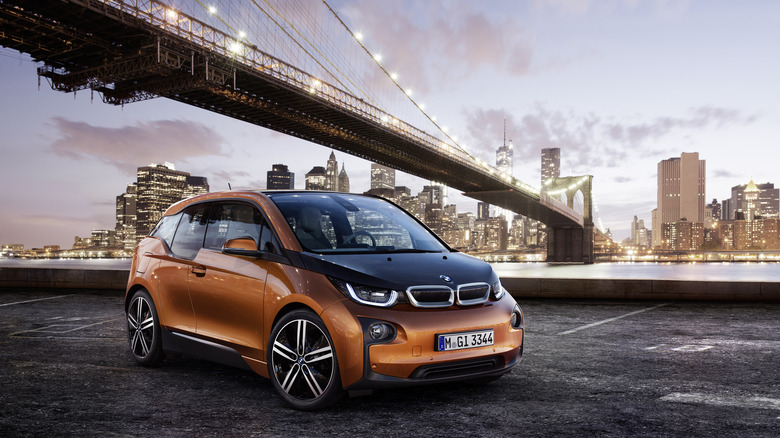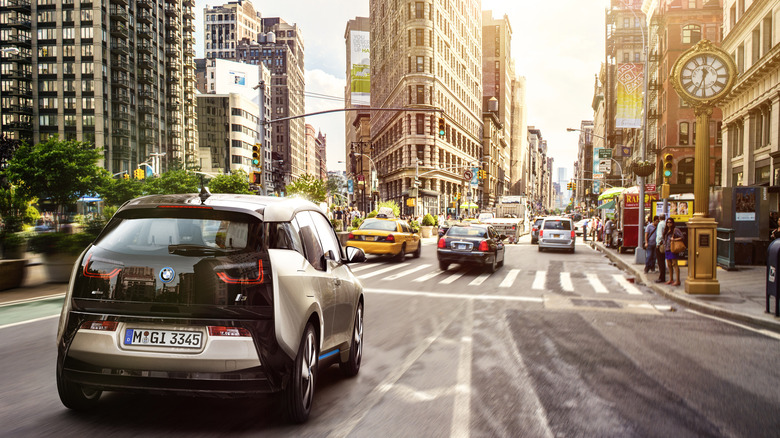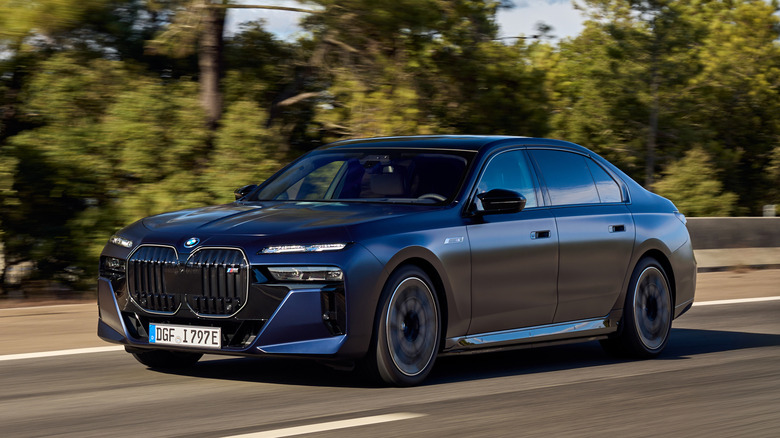Here's Why The BMW i3 Was Discontinued
EVs have come a long way over the last 10 years or so, and one pioneer of the current electric wave was the BMW i3. The i3 had a lot of characteristics you might spot in other early electric cars: The technology wasn't quite there and was limited in some aspects, the styling stood out to mixed reviews, and lessons were learned from it. Instead, it was a unique looking vehicle, with limited range and a high price tag.
The vehicle's range was such an issue in regions like the U.S. that a version with a "range extender" was released at launch as well. Said range extender contained a small gas tank that could be filled and used to power a generator which would in turn add some much needed charge to the batteries.
The initial generation of the BMW i3 (2014-2016) did start at 84 miles of all-electric range, though when equipped with the range extender option, was capable of 150 miles combined electric and gasoline range. 2017-2018 models saw an increase in battery capacity, bringing the all-electric range up to 114 miles — whereas with the range extender, the i3 offered 180 miles of combined range. The final model year i3 (2019-2021) was capable of 153 miles of all-electric range thanks to another battery improvement, while the range extender could get up to 200 miles combined. Some even made their own modifications in an effort to get extra mileage out of the i3.
Although it was an odd addition to the BMW lineup, and it had its faults. That said, some loved its unique styling, while others had the kind of lifestyle where a range of 81 miles of base model electric range — or up to 200 miles of range with the range extender option — wouldn't be an issue. Either way, fans may have been a bit shocked when BMW discontinued the vehicle in 2022. In the automaker's defense, there was some logic behind the end of the i3.
Uptake killed the BMW i3
The i3 did sell, but not in the way BMW wanted. Over the nine-year span it was in production, the pioneering EV shifted under 50,000 units in the U.S. — most of which were sold at a discount. EV early adopters, rather than BMW's established customer base, tended to be the ones buying the i3 stateside. From the sounds of things, the people purchasing BMW's first electric vehicle weren't really fans of BMW, but rather fans of EVs as a concept. While having new customers is always nice, direct brand loyalty is a bit more important than a customer that is sold on a concept.
After all, if having an EV is the most important thing, then you're equally likely to snag your next one from Tesla, or Ford, or Mercedes, or Lucid, or Polestar, or any of the other EV automakers. As BMW design lead Domagoj Dukec told Bloomberg in 2022: "You don't reach just for these early adopters. You have to reach for the customer base that's been buying BMWs for generations."
In an attempt to reach out to its core customer base, BMW changed track. The i3 was no more, and the company began focusing on electrified versions of its larger vehicles instead. This would solve one of the main issues that the i3 had, which was its appalling range, and hopefully convince more of the brand's core customer base to go electric. That last part is pretty vital if BMW is to meet its ambitious EV targets.
BMW's current electric lineup is an extension of its ICE offerings
These days, BMW has a number of electric options, all of which can be directly compared to an ICE or hybrid model in its main lineup. The electric sedans on offer include the BMW i5, i4, and i7, while the BMW iX electric SUV is also on the market. While at the time of writing there is no all-electric M car, there are "M" packages available for the current electric lineup. These packages tend to drastically increase things like horsepower, give you a few unique trim elements, and make the graphics look a bit more exciting when you pop it in "sport mode."
There's a bit of a key difference here, too. Aside from the powertrain and the performance aspects that come with it, these are essentially just electrified versions of BMW's standards. Sit in an i5, and it's going to feel like a 5-series. The i7 is just a quieter, smoother, 7-series with a bit more punch off the line. You know what you're going to get each time. This all fits in with the logic that ultimately killed the i3.
If you want an electric Beamer, you'll get an electric variant of something that's very BMW and nothing else, and it's a strategy that may be paying off. In the North American market, 2023 was a record year for BMW, and EV sales were a large part of that. The German manufacturer sold 45,417 electric vehicles in total — or around 12.5% of its overall sales output.


